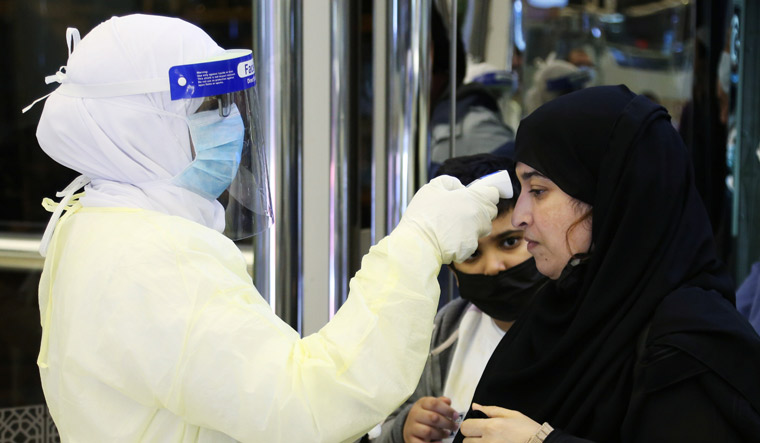Different countries have announced a series of travel advisories, entry restrictions and quarantine measures in a bid to contain the spread of the novel coronavirus (COVID).
According to a database maintained by Johns Hopkins University, the coronavirus statistics as of morning of March 12 were 126,136 total confirmed cases and 4,630 deaths. The cases have been reported across 114 countries and regions.
Nearly 81,000 of these coronavirus cases are in China. Italy (12,462), Iran (9,000), South Korea (7,755), France (2,284), Spain (2,277), Germany (1,966) and the US (1,312) are the countries in the list of nations with over 1,000 cases.
THE WEEK presents a list of restrictions on travel by various nations:
India: The Indian government announced on Wednesday night “All existing visas, except diplomatic, official, UN/international organisations, employment, project visas, stand suspended till 15th April 2020. This will come into effect from 1200 GMT on 13th March 2020 at the port of departure." The restrictions also affect OCI card holders. “All existing visas, except diplomatic, official, UN/international organisations, employment, project visas, stand suspended till 15th April 2020. This will come into effect from 1200 GMT on 13th March 2020 at the port of departure," the government announced.
Foreign nationals intending to travel to India for compelling reasons have been advised to contact the nearest Indian diplomatic mission. All incoming travellers, including Indian nationals, who had arrived from or travelled to China, Italy, Iran, Republic of Korea, France, Spain and Germany after February 15 would be quarantined for a minimum period of 14 days. India had suspended visas from many of these countries in previous weeks.
US: President Donald Trump announced late on Tuesday that his government was suspending travel from select European nations to the US for 30 days from midnight on Friday. Only travel to the UK and regions not part of the Schengen Zone has been excluded. Americans will be allowed in after multiple screenings.
According to guidelines from the Centres for Disease Control, foreign nationals who had visited China and Iran in the past 14 days are not allowed to enter the US. US citizens, permanent residents and their families would be allowed to enter after they have been screened at 11 designated airports; these people may also have restrictions on movement for 14 days. For South Korea and Italy, the CDS has recommended that travellers avoid non-essential travel. Travellers who return from these countries will have to stay at home 14 days after their arrival.
UK: According to its travel advice, updated on March 10, the UK's Foreign and Commonwealth Office, has travel restrictions in place only for China, parts of South Korea and Italy. The UK is currently in the first stage of its strategy to curb coronavirus, called the 'contain' phase. However, media reports indicate the Boris Johnson government could proceed to the second phase, called the 'delay' phase. The delay phase could involve measures to reduce large gatherings such as closure of schools and encouragement of work-from-home measures in a bid to minimise use of public transport.
Canada: Canada has advised nationals against non-essential travel to China, Italy and Iran. While no bans are yet in place, all travellers have been advised to 'self-monitor' for symptoms of COVID-19 such as fever, cough and difficulty in breathing for 14 days after returning to Canada.
Australia: Australia considers China, Iran, Italy and South Korea as being at a higher risk of COVID-19. Foreign nationals who have been in China or Iran will not be allowed entry to Australia for a period of 14 days after they left those nations. Foreign nationals who have been in South Korea on or after March 5 will not be allowed to enter Australia for 14 days from the time they left Korea.
All travellers coming from Italy have been asked to self-isolate themselves for a period of 14 days. Australian nationals, permanent residents and their immediate families coming from China, South Korea and Iran will be allowed to enter Australia but have to isolate themselves for 14 days.
Travellers coming from Cambodia, Hong Kong, Indonesia, Japan, Singapore and Thailand have been asked to monitor their health for a period of 14 days after arriving in Australia.
Saudi Arabia: Saudi Arabia on Thursday temporarily banned travel to 39 countries, including EU states, India and Pakistan, due to the coronavirus outbreak. Entry has also been suspended to all travellers who have been in these countries in the past 14 days. Indian medical professionals and those working in the shipping and trade sectors have been excluded from the ban. On March 9, Saudi Arabia had suspended travel to Oman, France, Germany, Turkey, Spain, United Arab Emirates, Kuwait, Bahrain, Lebanon, Syria, Iraq, Egypt, Italy, and South Korea and banned entry of travellers from these places.
Qatar: On March 10, Qatar banned entry to nationals from 13 nations, including China, Iran, South Korea and India. According to its website, Qatar Airways is unlikely to resume services to China, Italy and Iran till April 30 and South Korea and Egypt until March 31.










